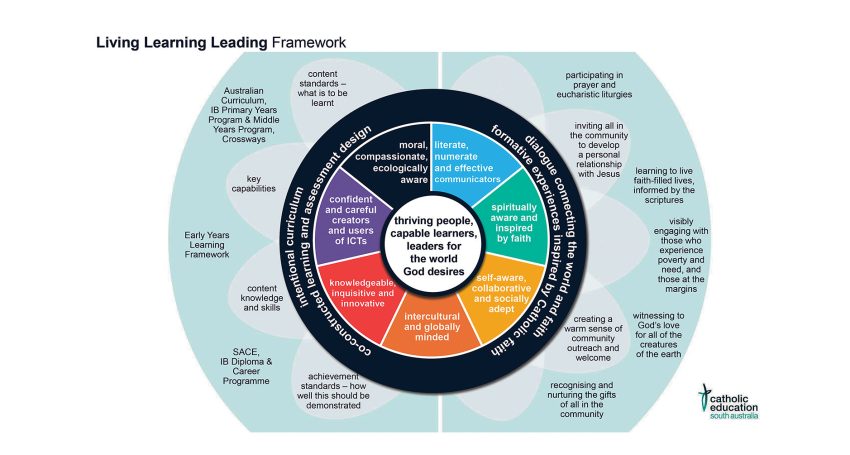Why a Catholic education matters
Schools
Returning to Catholic Education South Australia after some time spent as a government CEO, it is very obvious to me that Catholic schools have much to offer young people, families, communities and society as a whole.

Sometimes, though, people might not be aware of the benefits of a Catholic education or its positive impact on communities and the world more broadly. Sometimes, too, people may not even be aware of the remarkable history of Catholic education in Australia, which saw the Catholic Church follow in the footsteps of Christ to establish schools outside of city areas and, over time, develop a network of schools to meet the needs of the full range of children and young people, including the marginalised and displaced, which otherwise would not have been built.
Advertisement
It might also be the case that, today, when all schools are expected to be inclusive, and when the vision of schooling in Australia is to ensure that each young person is a successful learner, a confident and creative individual, and an active and informed citizen, some may assume that all schools are the same. They might further assume that there is nothing different, or unique, about a Catholic education, or a Catholic school. And, when facing the prospect of choosing a school for their child or children, some parents might think that, regardless of which one you choose, the curriculum, approach to teaching and learning, the educational outcomes, and even the underlying value system are likely to be very much the same.
In reality, this isn’t the case at all. However, the fact that some people, including parents, think that way, is a very clear indicator that Catholic Education South Australia, and perhaps even some of our Catholic schools, could more effectively describe who we are, what we stand for and how we do it. Not to mention why, in the context of an evolving, globally focused and digital world, a Catholic education really does matter for young people, families, communities and society as a whole.
So, to support this narrative, give life to the vision, values and mission of Catholic Education, and to ground these in curriculum, learning design, dialogue and formative experiences, Catholic Education South Australia has developed the Living, Learning, Leading Framework.
This Framework, which is in action in each of our schools, captures the essence of a Catholic education – and what we truly mean when we say that a Catholic education integrates faith, life, learning and culture so as to nurture children and young people to be willing and able to take their place in society as leaders for change in the world.
As the Framework highlights, the purpose of a Catholic education is to acknowledge that every child is and will be a thriving person, a capable learner and a leader for the world God desires. A Catholic education helps children and young people come to appreciate that this is who they are and who they are called to be, and supports them to develop the specific knowledge, skills and attributes (referred to as key capabilities) that are associated with thriving, learning and leading in a rapidly changing and complex world. These key capabilities are:
Advertisement
• being spiritually aware and inspired by faith;
•. being self-aware, collaborative and socially adept;
• being intercultural, and globally minded;
• being knowledgeable, inquisitive and innovative;
• being moral, compassionate, and ecologically aware;
• being confident and careful creators and users of ICTs;
• being literate, numerate and effective communicators.
In addition, the Framework draws attention to our approach to Catholic education, which privileges the meaningful and respectful partnerships between educators and students who, together, co-construct curriculum and learning design, undertake formative experiences inspired by Catholic faith, and engage in open dialogue about the relationship between the world we know and the faith to which we are called.
To this end, through this partnership and dialogue, each child and young person in a Catholic school is invited into a relationship with God through the person of Jesus. They regularly participate in prayer and liturgy, and engage with the Scriptures to contemplate the depth of that relationship and how the Scriptures might help shape a faith-filled life in today’s world.
Most powerfully, each child and young person is invited to express that relationship with Jesus – essentially to witness to it – in their school and beyond. They do this by creating a warm sense of welcome and outreach, both in their school and in the community more broadly. Children and young people in our Catholic schools do this by visibly engaging with those who experience poverty and need, and those at the margins. They do this by witnessing to God’s love for all of the creatures of the earth, and by recognising and nurturing the gifts of all in the community.
When we stop to think about a Catholic education, it becomes very clear why and in what ways, it is valuable for any young person. After all, who wouldn’t want an education like that for their own children? And, moreover, communities and society as a whole certainly are enriched by the presence of Catholic Education South Australia.
Dr Neil McGoran is Director of Catholic Education South Australia







Comments
Show comments Hide comments